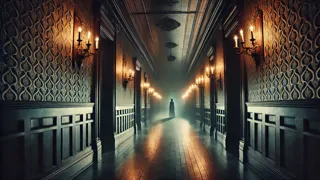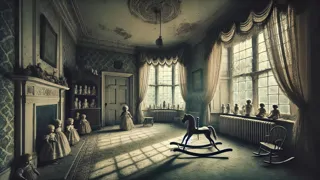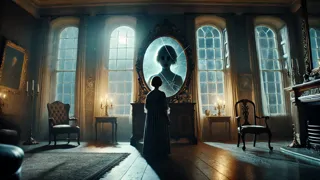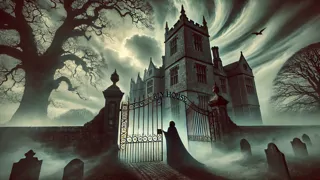Introduction
As the carriage wheels ground to a halt on the pebbled drive, Miss Isabelle Turner stepped onto the cold earth beneath towering oaks whose knotted branches seemed to whisper warnings. Bly House rose before her, its pale stone walls washed in the half-light of a brooding sky. She felt the hush at once—an oppressive quiet that draped the manor like a funeral veil. Moving along the mossy steps, she paused before the great oak door carved with fading heraldry. A single servant, gaunt and silent, awaited inside, his gaze flickering between her and the yawning entrance hall. With gentle resolve, Isabelle accepted her charge—two orphaned children entrusted to her care—and passed through the threshold. Within, portrait-lined corridors stretched into darkness, punctuated by flickering lamps that cast more shadows than light. The air smelled of damp linen and time’s slow decay. Somewhere beyond, a child's laugh—a soft, hollow sound—breathed against the walls, though both Flora and Miles were safely asleep. Her heart beat quick. Was it a trick of the wind against shuttered windows, or a voice not meant to be heard? Each breath felt measured, her senses sharpened by exhaustion and unease. Even the polished banister beneath her fingertips seemed to hum with unseen life. And so, in that moment of hushed suspense, Isabelle Turner realized her greatest task would be to safeguard innocence not only from the dark rooms of Bly but from the dread that lurked just beyond perception.
Whispers on the Landing
In the gloom beyond the drawing room, a corridor stretched into wavering darkness. Isabelle’s lamp flickered, tossing pale rings of light that danced across carved wood panels decorated with ancient coats of arms. A cold draft drifted along the floor, pushing her skirts upward and carrying a faint murmur of voices. She hesitated at the head of the grand staircase—each step polished smooth by decades of footfalls, each bannister spur carved in the shape of twisted vines. The hush here was absolute, as though the house itself held its breath. Then came a soft sigh, half whisper, half sob, drifting from a landing above. Isabelle’s pulse quickened. No lamps burned overhead. Were the servants so careless as to leave candles extinguished? She moved upward, hand on the banister, eyes straining beyond the reach of the lantern’s glow.

A sudden rustle. She froze, listening as echoes moved along the corridor. The muffled sob resolved into a whispered name—Miles. Her chest constricted. The boy? She advanced, heart hammering, every nerve alert. On the landing she found nothing but dim recesses between heavy doors, the hush broken only by her own measured breathing. Yet beyond the next closed door, the murmur came again, as though drawn just from thin air. Gently she pressed her ear to weathered oak, her lamp’s glow revealing scratches and dents. "Miles?" she whispered. Silence, then a faint scratching as though nails traced the wood from within.
When at last she summoned enough courage to turn the handle, her lamp slipped. Flame wavered before she tightened her grip. The door swung inward to reveal an empty guest suite—silk curtains moth-eaten and draped limp around high windows. No sign of children, no footprints in the dust. Only the echo of that plaintive name.
Isabelle stepped inside, lamp raised. She circled the room, each corner deeper in shadow than the last. The fireplace held cold ashes, the hearth like a hollow mouth. Overhead, the painting of a past Bly matron watched with a fading smile. Her heart twisted. Had she imagined the voice? But then, as she reached the windowsill, the reflection in the glass shifted: a pale face, half-hidden by loose curls, blinked at her with hollow eyes. In terror she jerked the lamp forward. The shape vanished. When she dared to look again, the mirror only held her own startled reflection, cheeks wet with sweat. And somewhere beyond the glass, the corridor stood silent as the night, holding its breath for footsteps that would never return.
The Hidden Nursery
Beneath the east wing, Isabelle discovered a door concealed behind a tapestry of floral brocade worn threadbare at the edges. Pressing the latch produced a hollow click, and she entered a room that smelled of stale air and childhood left behind. Tiny chairs, chipped and splintered, circled a low table strewn with half-broken toys: a porcelain doll missing one arm, a music box whose key lay twisted at its side, and wooden soldiers whose paint had long since peeled. Ivy grew through a cracked windowpane, tendrils curling across an embroidered rug. The silence was unnatural—perfectly pitched to amplify each breath and footstep.

As Isabelle moved between the playthings, the music box stirred of its own accord: a brittle tinkle that rose and faded. She spun, lamp held high, but saw only the toys, perfectly still once more. Her breath caught as a small chair scraped against the floor behind her. She whirled, but the lamp illuminated only vacant space. Dust motes drifted in the wavering flame, and a thin curtain fluttered despite closed shutters.
On the nursery table lay a scrap of paper, yellowed and torn—an entry from a previous governess’s journal. She read by lamplight: "They come at dusk to claim their play, yet vanish when the maid returns. I fear them not, but worse, I fear what I might become if I remain." A shiver ran through Isabelle. The handwriting trembled, as though penned by a hand deterred by dread.
A sudden wail erupted somewhere deep in the walls, low and aching. Isabelle rushed to the center of the room, lamp high above her head, and called softly, "Flora? Miles?" No answer. Before her eyes, a wooden rocking horse began to rock, its hollow thud echoing like a heartbeat. The governess stepped forward, heart pounding, and placed a hand on its worn mane. The rocking ceased. Silence wrapped around her, more oppressive than the darkness itself.
Yet there, etched into the dusty window frame, she saw a small set of footprints leading outward—tiny and bare, yet impossibly fresh. The door behind her clicked closed.
Revelations in the Mirror
At the stroke of midnight, Isabelle returned to the drawing room for a final check on the children. She paused beneath a towering mirror crowned with curling vines of gold leaf. Legend held it once belonged to the house’s founder—a vessel for the restless or the damned. Her reflection stared back, pale in candlelight. But then, just behind her, another figure flickered into view: a small boy in a dark suit, eyes too ancient for his age. Isabelle spun, lamp clattering to the floor. When she rose, heart in her throat, only empty air remained.

Compelled by equal parts terror and duty, she pressed her palm against the mirror’s cool surface. A chill tremor shot through her arm. In the glass, Flora appeared at her shoulder, hair loose around her face, eyes wide with silent appeal. Isabelle gasped, stepping back, and the child vanished. The governess sank to her knees, trembling, caught between relief and dread. She whispered apologies to the void, for the children she might have failed to protect.
Something moved in the mirror’s depths—an amorphous shape that solidified into the gaunt face of Peter Quint, his grin thin as a silver blade. He pointed toward the children’s wing, as though commanding her to follow. Cold dread surged. She recalled the horror stories of Quint’s reckless influence on the boys who once lived here. He had died years ago, and yet here he stood, summoned from the depths of memory or whatever malevolence lingered in these walls.
Determined, Isabelle rose, gathering lamp in shaking hands. With each step toward the west corridor she felt the weight of unseen eyes. Footsteps echoed beside her, though no one walked. Whispers tumbled from closed doors, “Protect us… see the truth...” She reached the bedroom where the children slept in twin beds, blankets pulled tight. Both were motionless, breath even. Relief washed over her, quickly stifled by a realization: the apparitions she had seen might be no more real than her own fear, yet they bore the imprint of anguish that refused to fade.
In that moment, poised between dawn and nightmare, Isabelle vowed to face whatever shadows had taken root in Bly House. For the sake of Flora and Miles, she would unlock each secret door, confront each whisper, until the boundary between past and present, living and dead, could no longer hold her captive.
Conclusion
When dawn finally broke over the mist-shrouded moors, Isabelle Turner gathered her belongings and stood at the crest of the winding drive, the battlements of Bly House receding behind her like a fading nightmare. She could no longer deny the gravity of her convictions or the weight of her uncertainties. Every polished surface, every hollow echo, every fleeting glimpse of form would haunt her memory—and though she walked toward the rising sun, each step carried the tremor of unspoken horrors. The children she left behind slept peacefully as if untouched by what had transpired, leaving her to wonder if the terrors were her own creation or the restless outcry of tortured souls. In the quiet that followed, the boundary between seen and imagined felt more tenuous than ever, and the journey home became less an escape than a continuation of a mystery that would not be laid to rest.


















